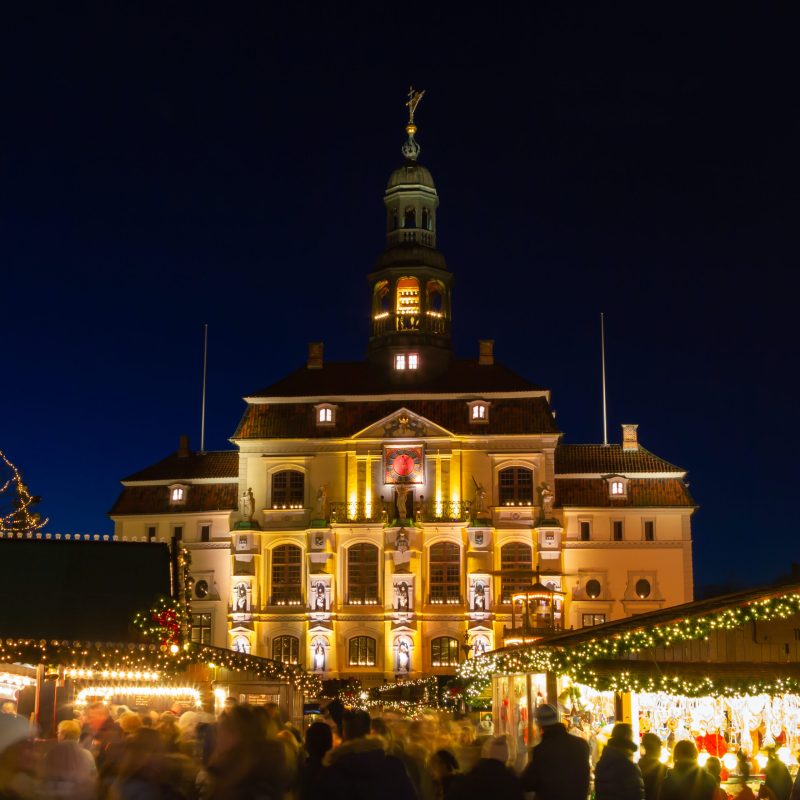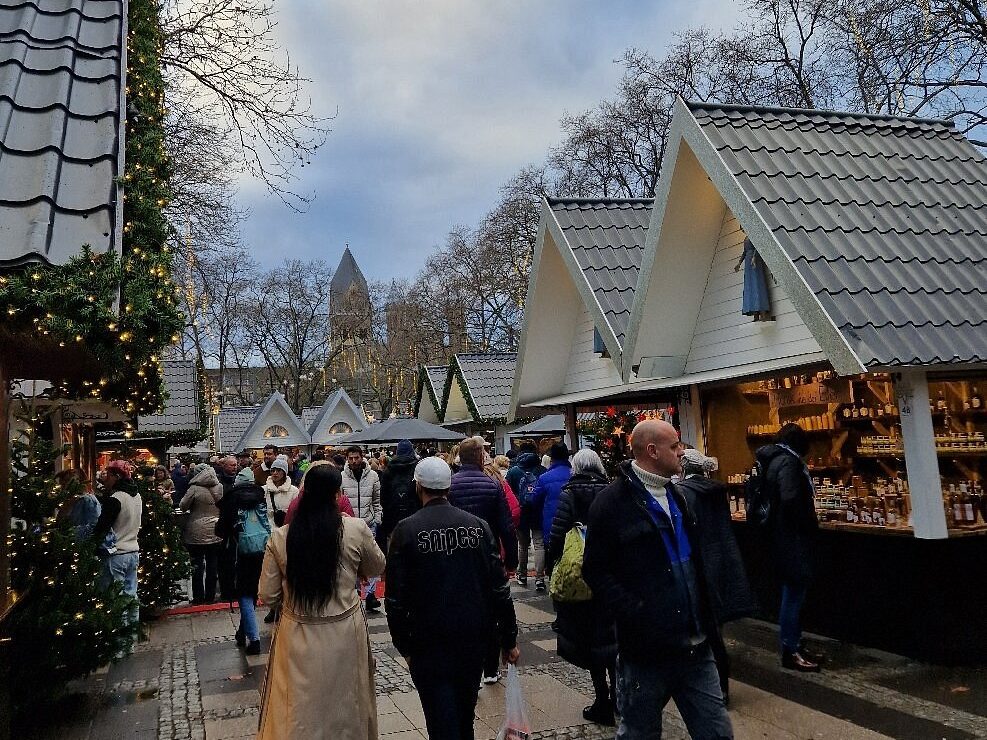
Note: The Travel Awaits team regularly updates content to provide the latest, and most accurate information to our readers. The updated content in this article may not reflect the views or opinions of the original author.
Videos by TravelAwaits
Christmas is approaching fast, and with the festive season, many German towns turn into wonderlands to the delight of young and old. Be it big cities or rural smaller towns, they all open their jewelry boxes and take out their best lights and decorations, glitter, trees, and angels to make the already beautiful places even prettier. November, December, and even early January are a time of magic in Germany.
If it snows, which it often does at that time of year, that is an extra bonus. The centerpieces of this magic are the many German Christmas markets, a tradition that actually originated in Germany. They spring up all over the country, with decorated wooden stalls selling delicious food and mulled wine, handmade trinkets, and baubles of all colors. If you are short of Christmas presents for your loved ones, you are bound to find something nice at the Christmas markets.
And more often than not, there is more in the way of entertainment. From ice skating rinks to music or giant Ferris wheels, German towns at Christmastime are perfect for the entire family stretching across generations.
Here are some of my favorite cities to visit over Christmas, in no particular order.
8 Contenders for the Best Christmas Town in Germany
1. Lüneburg
If you are a fan of the fairy tales of the Brothers Grimm, Lüneburg, located just 40 miles from my hometown of Hamburg, is the place for you to visit at Christmas time. Surrounded by the Lüneburg Heath, a sea of purple in summer, and a fascinating snowscape in winter, Lüneburg is an ancient city with countless medieval houses that provide an enchanting background for the Christmas market.
It is installed in the pedestrianized area, and the wooden huts are all themed on the fairy tales of the Brothers Grimm. Meet Little Red Riding Hood, Hansel and Gretel, and all the other figures we know from our childhood, and smell the scent of roasted chestnuts, candied almonds, and apples.
While browsing for handmade trinkets and decorations for your Christmas tree, warm yourself with mulled wine. German mulled wine, known as Glühwein, is a beloved winter drink. Made with red wine, spices like cinnamon and cloves, citrus fruits, and sugar, it’s heated to create a warm, aromatic drink enjoyed during the festive season of Christmas and New Year holidays.
Where To Eat
The Krone Brauhaus serves good beer and traditional, hearty food in a lovely setting.
Where To Stay
Book accommodation in one of the farmhouses, sit by the roaring fire, relax, and recharge your batteries.

2. Munich
Munich, the capital of Bavaria, is a fairy tale at Christmas time. With the snow-covered Alps as the backdrop, the city is prettier in winter than at any other time of the year. And those Christmas markets are superb. The oldest one — which dates back to 1310 — is at Munich’s Marienplatz with a 100-foot-high Christmas tree standing in front of the New Town Hall. For a bit of an alternative approach, head to the Pink One, all decorated in pink and with special gay parties on the agenda for LGBTQ+ travelers and all others.
If you want to take in all the Christmas trees and decorations in the city, why not join a walking tour and taste your way through the markets?
Where To Eat
Try the scrumptious Dampfnudeln on the markets. Soft, warm dumpling dough covered in vanilla custard. Sinful, yet light.
Where to Stay
The family-owned hotel Bayerischer Hof offers special Christmas and New Year dinners.

3. Leipzig
Leipzig is located in Saxony on the confluence of the rivers Elster, Pleisse, and Parthe which later join the Elbe. It has one of the oldest universities in Germany, a Renaissance town center, museums, and three Christmas markets. Although it does not snow as often as in Bavaria, when it does, there are plenty of activities like cross-country skiing and even sled rides in several of the many parks.
The three Christmas markets cover the expanse of Market Square, Naschmarkt, and Augustusplatz date back to 1458. Something Leipzig offers that no one else has is the St. Thomas Boys Choir, which was, in its day, led by Johann Sebastian Bach. It still performs special Christmas concerts.
Where To Eat
Try the Leipziger Lerche, a pastry filled with ground almonds, nuts and strawberry jam, which you will find everywhere at the Christmas markets and cafes.
Where To Stay
Head straight to the Steigenberger Grandhotel Handelshof right by the Naschmarkt market.

4. Düsseldorf
Düsseldorf, located at the river Rhine in North Rhine Westphalia, is associated with luxury, glitz, and glamor at any time of the year, but at Christmas, the wealthy city surpasses itself. When I lived there, straight after school, I could only window shop on Königsallee with all its designer boutiques. But at Christmas, its pretty lights were enough. More my scene was the Altstadt, the old town, a warren of cobbled streets — and bars — steps away from the rich glitter.
Then there are the typical German Christmas markets, officially seven of them, some with such romantic names as Sternchen Markt (“little star market”), Engelchen Markt (“little angel market”), and Märchen Markt (“fairy tale market”). They all have different themes and live up to their names, making Düsseldorf one of the most beautiful cities in Germany to visit over Christmas and during Advent.
Where To Eat
At the Christmas markets, try the warm waffles with cherries and cream.
Where To Stay
If you can, splash out on the Breidenbacher Hof, centrally located on the Königsallee.

5. Prien Am Chiemsee
Remember Pieter Bruegel’s painting from 1595 with ice skaters, called Winter Landscape? Well, that could exactly depict the small Bavarian rural town of Prien am Chiemsee. The town never fails to awe with its natural beauty in winter. Located on the shore of the large Chiemsee, surrounded by the Bavarian Alps and forests, and with two islands in the middle of the lake, this small town is the epitome of winter heaven.
More often than not, the lake freezes over, which allows skaters and hikers to reach one of the islands, Herreninsel, on foot. The island houses the last of King Ludwig of Bavaria’s romantic castles, called Herrenchiemsee, with gardens modeled on Versailles. Already pretty in summer, it is outstanding when covered in snow. Small Prien may be, but it also hosts the coziest Christkindl market you could imagine — only about 15 to 20 wooden stalls, decorated with stars, angels, baubles, and Papa Noels.
Where To Eat
If you still have space after sampling the delights at the German Christmas market, stay in and eat the hearty home cooked dishes in the hotel’s restaurant.
Where To Stay
Garden Hotel Reinhart faces the lake and the promenade and is about 10 minutes on foot from the town center and Christmas market.

6. Augsburg
Another enchanting Bavarian town at Christmas is Augsburg. Known as the “Fugger Stadt” because of the famously rich Renaissance Fugger banking family, Augsburg is located on the Romantic Street and full of history and medieval architecture as well as the origin of the German Rococo and Baroque styles.
Naturally, Augsburg has a pretty Christmas market, here called Christkindlsmarkt, too, but there is a highlight you won’t find anywhere else. From the beginning of Advent, each weekend, the Town Hall is transformed into a giant calendar with 24 golden angels coming out of the doors and windows in the evening and delighting the crowd with Christmas carols.
Where To Eat
The lovely Berghof Restaurant serves up seasonal dishes and regional, hearty, and winter-perfect cuisine.
Where To Stay
Stay at the traditional DOM Hotel, and for extra coziness, ask for a room under the roof.

7. Freiburg
Freiburg is a lovely little town near the Black Forest and is nearly as good in summer as it is in winter. But head down the narrow alleys, past the little stream and the colorful — if slightly crooked — houses in winter, when things are lit up with fairy lights, trees decked out and windows decorated, and bingo! The Rathausplatz, Town Hall Square, is filled with chalets and towered over by a huge tree while the aromas of traditional Christmas fare waft through the lanes, and the little canal that flows through the town reflects the pretty lights.
Just perfect for Christmas, really. Add to that the proximity of the Black Forest, usually covered in snow at this time of year, with its traditional cuckoo clocks and wood carvings, and the magical Triberger Weihnachtszauber, and there is good reason to come again and again at Christmas time.
Where To Eat
The traditional Gasthaus Löwen is open over Christmas and serves up good, local fare with a festive touch.
Where To Stay
Treat yourself to a stay in a castle on a vineyard for extra charm.

PHOTO CREDIT: TRIPADVISOR.COM
8. Cologne
The advent season marks the start of the festive cheer in Cologne when every corner of this old town is festively decorated. Locals and visitors come to the Christmas Circus, the China Lights at the Zoo, the giant Christmas tree, and the famous Cologne’s Cathedral Christmas Market.
Strolling through Cologne’s Christmas markets, gorging on sweet snacks, and washing it all down with warming glasses of mulled wine, makes waiting for Santa Claus easy.
Where To Eat
Located in the Old Town area, Brauhaus Sion, a brewery restaurant near Cologne Cathedral is a great place to enjoy a classic German sit-down meal.
Where To Stay
It’s hard to beat the location and value City Apartments in Köln am Rheingarten offers.
Honorable Mention
Berlin
Germany’s capital probably deserves a separate review with so many things to do and see. If you want to visit a new Christmas market every day of your trip, Berlin is a great bet with more than 100 markets to choose from. You can ride the Ferris wheel, skate, enjoy the scenery of the City Hall, explore Berlin’s museums and attractions, and so much more to tap into the Christmas spirit and the city’s holiday cheer.
Pro Tip
As with most places that celebrate Christmas, you’ll find that many restaurants and shops are closed at the very least on Christmas Day, but also close early on Christmas Eve in Germany. It pays to book ahead, or at least let your hotel know you’d be eating in on Christmas Day, as otherwise, however lovely, you will be stuck with three meals at the Christmas markets.
FAQs
Is Germany Good for Christmas?
Yes, Germany is justifiably a go-to destination for Christmas. Not only do many festive traditions originate here, but it also happens to have an endless number of scenic castles, impressive cathedrals, and charming town squares adorned with Christmas lights to serve as fairytale backdrops.
What to Expect at German Christmas Markets?
Traditionally held in the town square, German Christmas market stalls offer beautiful and enchanting traditional handicrafts and festive delicacies, accompanied by traditional music dancing, and twinkling lights. It’s the time for mulled wine or children’s punch, for a wide variety of gifts, and for winter fun.
Is There a Christmas Market in Every German Town?
There are over 150 towns and cities throughout Germany with established traditions of a Christmas market. Many places have more than one market though. For example, there are around 70 Berlin Christmas markets in the German capital.
What Is the Best German Christmas Market?
The most famous German Christmas market is the Nuremberg Christkindlesmarkt. Other famous Christmas markets are the Leipzig Christmas Market, Esslingen Medieval Christmas Market, Stuttgart Christmas Market, Ravenna Gorge Christmas Market, and Marienplatzt in Munich, one of the oldest Christmas markets.
What Was the First Genuine Christmas Market in the World?
The Dresdner Striezelmarkt is considered the first genuine Christmas market in the world, dating back to 1434. Today, it’s a massive multiday event where over 200 stalls can be found selling traditional food, sweet treats, hot apple wine, and more.
